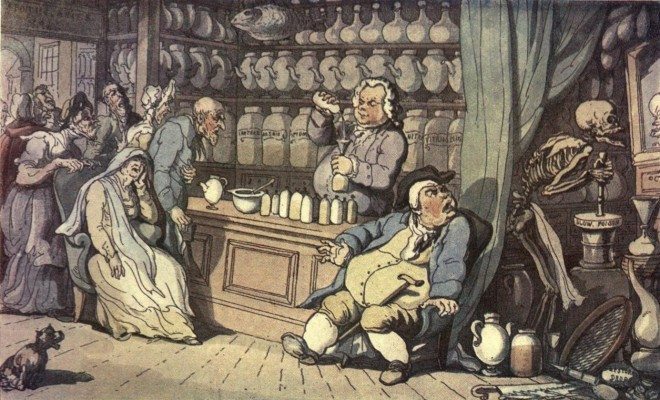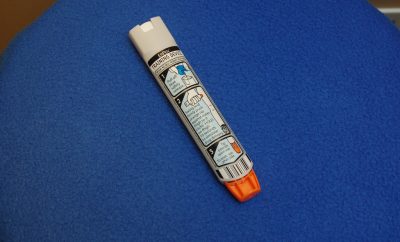 "The Quack Doctor" courtesy of [Arallyn! via Flickr]
"The Quack Doctor" courtesy of [Arallyn! via Flickr]
News
Need a Cure: It Will Only Cost an Arm and a Leg
A new drug called Sovaldi, developed by Gilead Sciences Inc., is now available on the market that cures between 80-90% of users from Hepatitis C Virus (HVC). This is a ground-breaking development in medicine, as approximately 3.2 million Americans currently suffer from Chronic HVC according to the Center for Disease Control. This new drug is administered as a twelve week treatment and costs $84,000 which is considerably lower than traditional forms of treatment at $300,000. But here is the problem: according to University researcher Andrew Hill, Sovaldi only costs $150 to $250 per treatment. How can Gilead charge such an unreasonable price for a life saving drug?
Bringing A Drug to the Market
Before we draw any conclusions about the reasonability of charging $84,000 for Sovaldi, we must understand the process of how drug manufacturers bring a new product to the market. Our government attempts to guarantee protection for consumers from unsafe products through regulatory oversight, which means that not any product can simply be sold in stores. A new product must complete a twelve step process of human and animal phase-testing, facility inspection, drug labeling, application review, and review meetings. This process can easily cost a billion dollars, meaning that the initial investment for drug development is steep one.
This high-cost initial investment creates a problem, namely, it can discourage innovation. In order to cover the start-up costs in production phase, a company needs to charge an inflated initial price to make up for the original high-cost investment. The problem is that another company could easily replicate the drug and make a knock-off product to sell at a much lower price, as they don’t need to worry about making up initial investments. This hiccup, of stifled innovation, has been dealt with by government intervention and protection. In order to incentivize medicinal innovation, the government provides extended patent protection, preventing companies from being undercut by sales replicate drugs at a cheaper price. Such patents can give companies an effective monopoly for quite some time.
The Ethical Concern
Although this form of patent protection ensures continued innovation, there is some concern regarding possible abuse of these safeguards. When we revisit the question regarding the reasonability of Gilead charging $84,000 for the treatment, it is understandable that they must charge an initially high price. However, what happens when these costs have been covered? Mike LaBossiere reports that “when asked if Gilead would reduce the cost once it recovered its money, the vice president [Gregg Alton] of the company said, ‘that’s very unlikely that we would do that. I appreciate the thought.” Alton defends this position by claiming that, “those who are bold and go out and innovate like this and take the risk — there needs to be more of a reward on that. Otherwise, it would be very difficult for people to make that investment.”
Alton’s claim seems reasonable, yet Gilead’s opposition to lowering the price of Solvadi, after covering investment costs, raises serious concerns regarding public welfare. It appears that a company like Gilead might be exploiting this fact when they develop the “fair price” at which to sell the drug.
The Solution of State-Capitalism
Government patent protection of new medical products should be coupled with temporary partial government ownership of the company as a stockholder. Essentially, for a certain period of time, drug companies would function as a public sector undertaking. This would have two benefits. First, the drug company still functions as a profit based competitive initiative keeping the reward system to spark risky business ventures like developing a new drug. Second, having the government as a large shareholder would help combat extreme price inflation that prevents accessible medicine for the severely and terminally-ill.
Some may be hesitant about the idea of state capitalism, but we shouldn’t be too hasty to throw it out as a possible solution. In fact, government owned businesses are some of the most successful ones in the world. The Economist reports,
State capitalism can also claim some of the world’s most powerful companies. [Such as] China Mobile is a mobile-phone goliath with 600m customers. Saudi Basic Industries Corporation is one of the world’s most profitable chemical companies. Russia’s Sberbank is Europe’s third-largest bank by market capitalisation. Dubai Ports is the world’s third-largest ports operator. The airline Emirates is growing at 20% a year.
If it is the case that government owned businesses have the ability to stimulate innovation, prove successful, and protect the public from exploitation, we may want to consider them as a possibility in cases like drug and medicine development.
[TPM] [FDA] [NPR] [The Economist]








Comments